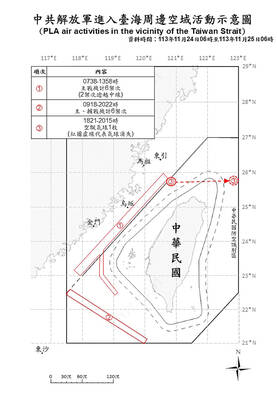Despite a slight decline in defense spending for next year, the draft budget shows the determination of President Ma Ying-jeou’s (馬英九) administration to develop homemade weapons systems, a Chinese Nationalist Party (KMT) lawmaker said yesterday.
KMT Legislator Lin Yu-fang (林郁方) offered his analysis of the draft defense budget statement delivered to the legislature yesterday for review in the upcoming legislature session, which is scheduled to open on Sept. 18.
The draft budget signals a new era of development of the nation’s homemade counterforce weapons systems, showing that the Ma administration has not slackened in enhancing the nation’s self-defense capabilities when pursuing cross-strait rapprochement, Lin said.
NT$2.5 billion (US$83.6 million) has been earmarked for the mass production of the indigenous Hsiung Feng-IIE (HF-2E) missile and the draft budget sees a 30 percent increase in next year’s spending, Lin said.
The statement showed that the government has allocated a budget of NT$35.9 billion for the next 12 years beginning next year as part of a plan to build six mine-hunting ships, which are to help Taiwan boost its anti-blockade capabilities for its naval forces, Lin said.
According to the budget, Lin said, the nation is set to spend NT$230 million integrating systems for the domestically-produced air-to-surface missile, dubbed “Wan Chien,” and of the capability-enhancement program of the Indigenous Defense Fighter (IDF), or Ching-kuo fighters, next year, earlier than originally planned.
The production of Wan Chien missiles, designed to arm Ching Kuo fighters and which can be launched at stand-off ranges to strike Chinese targets, are slated for 2014.
Lin said that each Wan Chien missile is believed to contain more than 100 explosive warheads that will be able to crater airports and runways or disable port facilities along the southeastern coast of China.
About NT$700 million was allocated in next year’s budget for naval forces to continue building the first offshore patrol ship that can carry eight Hsiung Feng III supersonic anti-ship missiles and eight Hsiung Feng-II supersonic anti-ship missiles, he said.
The budget showed Taiwan is set to spend about NT$55 billion in arms procurements from the US next year, including purchases of AH-64D attack helicopters, UH-60M Black Hawk utility helicopters and Patriot Advanced Capability-3 (PAC-3) missiles along with Patriot PAC-2 enhancements and F-16A/B fighter upgrades, Lin said.
Lin said the budget for US defense purchases accounted for 66 percent of the total spending of NT$81.5 billion written up for military investment projects next year.
The government has allocated NT$314.5 billion, or 16.17 percent of the central government’s budget, in defense spending for next year, a decline of NT$2.7 billion compared with this year.

A decision to describe a Chinese Ministry of Foreign Affairs statement on Singapore’s Taiwan policy as “erroneous” was made because the city-state has its own “one China policy” and has not followed Beijing’s “one China principle,” Deputy Minister of Foreign Affairs Tien Chung-kwang (田中光) said yesterday. It has been a longstanding practice for the People’s Republic of China (PRC) to speak on other countries’ behalf concerning Taiwan, Tien said. The latest example was a statement issued by the PRC after a meeting between Singaporean Prime Minister Lawrence Wong (黃循財) and Chinese President Xi Jinping (習近平) on the sidelines of the APEC summit

Taiwan’s passport ranked 34th in the world, with access to 141 visa-free destinations, according to the latest update to the Henley Passport Index released today. The index put together by Henley & Partners ranks 199 passports globally based on the number of destinations holders can access without a visa out of 227, and is updated monthly. The 141 visa-free destinations for Taiwanese passport holders are a slight decrease from last year, when holders had access to 145 destinations. Botswana and Columbia are among the countries that have recently ended visa-free status for Taiwanese after “bowing to pressure from the Chinese government,” the Ministry

HEALTHCARE: Following a 2022 Constitutional Court ruling, Taiwanese traveling overseas for six months would no longer be able to suspend their insurance Measures allowing people to suspend National Health Insurance (NHI) services if they plan to leave the country for six months would be abolished starting Dec. 23, NHIA Director-General Shih Chung-liang (石崇良) said yesterday. The decision followed the Constitutional Court’s ruling in 2022 that the regulation was unconstitutional and that it would invalidate the regulation automatically unless the NHIA amended it to conform with the Constitution. The agency would amend the regulations to remove the articles and sections that allow the suspension of NHI services, and also introduce provisional clauses for those who suspended their NHI services before Dec. 23, Shih said. According to

‘GRAY ZONE’ TACTICS: China continues to build up its military capacity while regularly deploying jets and warships around Taiwan, with the latest balloon spotted on Sunday The US is drawing up contingency plans for military deployments in Japan and the Philippines in case of a Taiwan emergency, Japan’s Kyodo news agency reported. They would be incorporated in a first joint operation plan to be formulated in December, Kyodo reported late on Sunday, citing sources familiar with Japan-US relations. A US Marine Corps regiment that possesses High Mobility Artillery Rocket Systems — a light multiple rocket launcher — would be deployed along the Nansei Island chain stretching from Kyushu to Yonaguni near Taiwan, Kyodo said. According to US military guidelines for dispatching marines in small formations to several locations,